Love, love, love. The salve & the cure.
Can love actually save us? 'Omnia vincit amor' & other uncertainties.
Today is St. Valentine's Day, & naturally, my thoughts have turned to love. Lately, I have begun to think more seriously of love’s worth, the color it lends our lives, the power it holds. I wonder, is it true that love can rescue a life? That a lover’s warmth can fill a barren life with purpose, sing light into a dead world or lift a mourner from his misery?
“Omnia vincit amor: et nos cedamus amori.”
— Virgil, Eclogues
“Love conquers all; let us, too, yield to love!” Virgil recorded it thus in his tenth Eclogue; seventeen centuries later, the Italian painter Caravaggio adopted it as the subject of one of his most memorable works. The adage has since lived on to influence the hearts of successive generations, burying itself, like one of Cupid’s own arrows, in the fabric of our cultural lexicon.
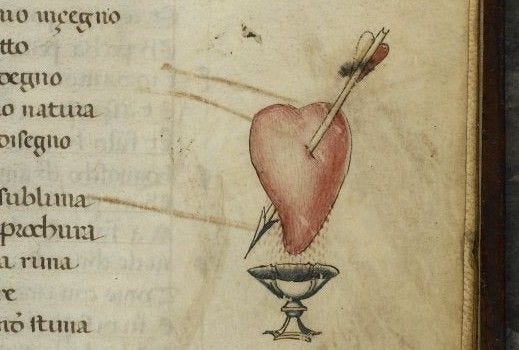
It is a pretty philosophy—that, with love as our armor, we can pass through the tangles of adversity & emerge on the other side, egg-smooth & stainless. It is also, perhaps, a hubristic one: an overestimation of our human capacity to love purely, openly, enduringly.
Yet this is the way all fairy stories end. The shining prince, the kiss of life; the dragon vanquished, the maiden awakened; goodness, peace, & order restored. Love is what spurs the gallant forward; it is always the highest boon, the trophy, the blessing, the chest of gold, the miracle draught, the prize for the highest bidder.
We are all guilty in the telling of this story—have been guilty of it since the beginning. I know I am.
From the day we draw breath to the moment we lay down our weary heads, the world screams: You were never meant to be lonely! Every sad turtledove must find its pair. The idea of love is not only attractive to us—it is vital. We have mythologized love into something larger than we can comprehend, & somewhere along the way, it became synonymous with victory, eternity, salvation. We can trace this ribbon through time, running over generations of human thought, unraveling across the pages of our greatest creative works.
Often, literature has engaged with the idea that love legitimizes, makes holy whatever it touches. Romeo & Juliet make light of the notion in their first fateful meeting:

For even the wretchedest of creatures, the possibility of love implies a certain degree of redemption, a chance to wipe away the past like a sinner in the confessional.
In Crime and Punishment, Raskolnikov confesses his terrible deed, after, & only after, he has begun to fall for the gentle-hearted Sonya. Atonement is a choice he makes of his own free will, but it is Sonya’s unconditional regard that drives him into the light, urges him not to abandon his pursuit of forgiveness in spite of the bleakness all around him. In a moment of hopelessness, Raskolnikov asks himself what he has to live for—what could possibly make his suffering worth enduring—what force on earth is potent enough to redeem a murderer?
The answer soon comes. Dostoevsky writes:
“They were both pale and thin; but those sick pale faces were bright with the dawn of a new future, of a full resurrection into a new life. They were renewed by love; the heart of each held infinite sources of life for the heart of the other.”
— Fyodor Dostoevsky, Crime and Punishment (1866)
Love’s virtue, love’s overwhelming power has forever been a favorite subject among artists, poets, playwrights, and no voice has sung its praises louder than that of the Romantics. Love is at the center of every ballad; it trembles at the end of every stanza & lives between the spaces in the verse. Mankind seems to be as inclined toward love as a daffodil is toward spring. It would be our most natural impulse to abandon ourselves to it, Shelley believed.
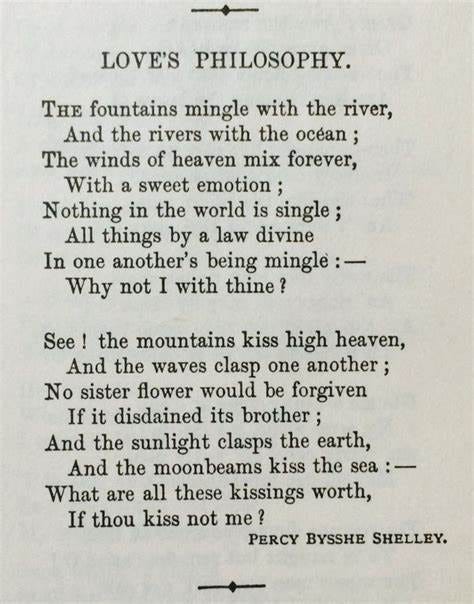
If nowhere else, it is on the written page that love becomes invincible, almost divine. Once caught in the ink, intangible sensation is transformed into immortal artifact. A poet loves a woman, & his passion is recorded for all time; paradoxically, love lives on long after it has ended. This is the tallest aspiration—love at its most victorious.
Yet there are those who would still deny the essential nature of love, which is, to conquer.
Cynics scoff. At best, these love narratives are wishful: beliefs belonging to the realm of fantasy, not here in the grip of our black & dangerous age. There is no true-love-everlasting-love-love-at-first-sight. Love can be explained away as no more than a cerebral cocktail, a dicey collision of chemical & neuron that induces feeling.
Or at worst, love is delusion on a societal level. The patriarchy spoon-feeding us traditionalism, conditioning us to idealize the marriage institution, or at least some adequate structure of hetero, monogamous partnership. Capitalism, selling us romance on the silver screen, on drugstore shelves & paperback covers, driving us feral with envy, desire, fear of dying alone, reducing amorous expression to cheap bon-bons, heart lockets, displays of withering roses. Love made political, commercial, vulgar, small.
This criticism is by no means inaccurate. But the reality is surface-deep; only a cynic chooses to see no further. Beneath the shiny lacquer of commodification & cliché, Aphrodite’s ancient heart beats on...
For very long I have worn the brave face all solitary women wear: I care for myself. That is enough. Truly, my solitude is dear to me; there are beautiful lessons to be learned in isolation. But there is also a wisdom uniquely acquired through the experience of loving & being loved. Sometimes, I like to imagine, who would I be in love? Already I am lovely on my own; enamored, I could be something lovelier.

At some point, “protecting one’s peace” feels like self-inflicted punishment. I would like to see myself gentled, sheltered, most of all—understood. Give me solace, give me trust; give me a shelf on which to rest my thoughts, hopes, fears, dreams, sensations. Total alignment of body, mind, spirit, soul.
If I am naive, I am not ashamed of it. What hurt is there in softness? You can regret the loss of love, the misfortune of affection turned to hate, but never the thing itself. You were not wrong to press a gentle hand against a cheek—the gesture was pure. If later the face turned away & sneered, that was no fault of love; for a moment at least, you felt its warmth kindle in your palm. You were comforted. If in that moment, the world went up in flame, you would’ve been held as it burned. That is not something one repents.
But if you never offered your hand, if instead it remained always empty & cold, even as you dreamed of filling it: you would have betrayed yourself. There is no justification for lovelessness. Keep your heart in chains & when the fear dissolves, you will be left with nothing, nothing but the debris of your once romantic reveries.
Even dead love leaves behind a memory. One day, someone told you that even the truest love fades, that the risk of death, divorce, decay outweighs the possibility of sweetness—& you believed them. I disagree. Even if you only held the taste of it in your mouth for a day, it would have been worth it. Isn’t that what all the poems are about?
Tennyson said: “‘Tis better to have loved and lost then never to have loved at all.”
I say: Pitch yourself into the fire while it is hot.
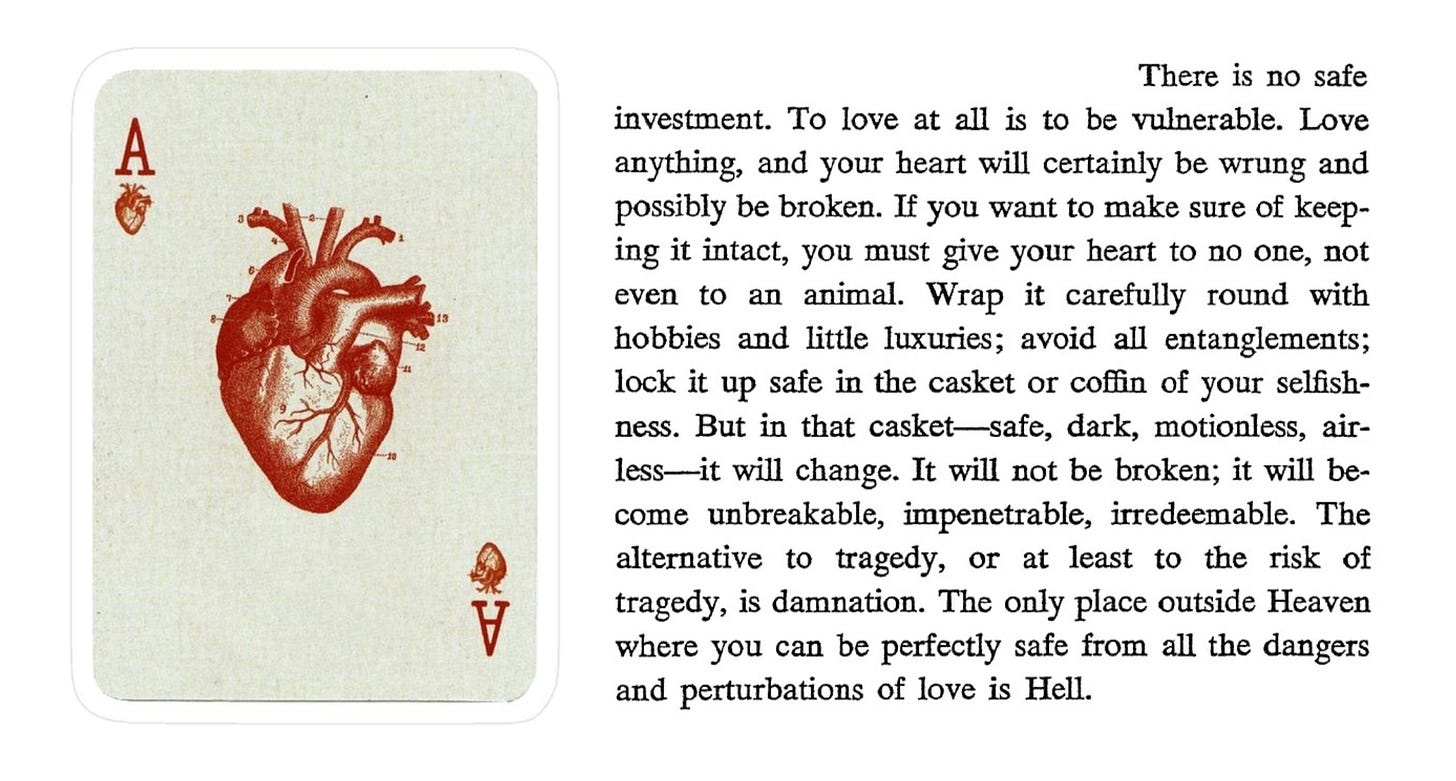
Yes, love is the very purest thing. This is not to say it is easy. Love, like any other fire you walk through, sears as it cleanses. If you’re not careful, you’ll lose yourself whilst in its clutches, wind up mad, broken, burnt.
But if you can give to another person: love, in its simplest incarnation—that is to say, without the weight of conditions, ulterior expectations—and are content to receive that same love in return, you will have found the way forward. C. S. Lewis knew it. Rilke, too.

Look, I’m not telling you how to love, or even who.
I only mean that if the moment strikes, if the feeling rips through you, sharp & sudden as a sneeze: give in to it. Cede amoris. Yield to love.
Remember, you can reach the sea from more than one channel. If you ever glimpsed a pair of lovers by a stream & remained unmoved, you are not sick or lost or unfeeling; there is a place for you in the order of things. There is more to love than mere eros. Aromanticism is not a death, but a rerouting. You must allow your heart to pour into other channels.
Let me elucidate.
Love is the hand pulling back the sheets, tracing the curve of my back where the skin is still warm from sleep. Eros.
But love is also: the stretch of laugh lines around my mother’s mouth, the parenthesis of joy I tease out with a joke. It’s a dog’s head curled to my chest: fleece & breath & heartbeat, all bared to my safekeeping. It’s childish scratchings, soft crayon smears on the back of an envelope—I can hold my brother’s love in two hands. Storge.
It’s the tickle of faith on my lips when I bend to pray. (Someday, I hope, this will be the brightest love of all.) Agape.
There’s love in the blending of paint; in every word I fold into prose; in the way I dust a lampshade or fix a cup of tea. Love even in the seeds I tuck into the dirt—the proof is in the blooms. Meraki.
Love in the memory of a lost friend: pinching my waist in the backseat of the car, the pair of us peeling green almonds from a sack & rolling them on our tongues, English rock on the stereo smothered by schoolgirlish giggling. Philia.
The love follows me into my loneliness, too. It’s in the sounds of the city at a streetside café; in the pastry flaking on my lips, falling over my lap like snow; in my throat as I laugh at my sweet, sweet unraveling. Philautia.
Love is in all this & more. I know not everyone can be so lucky.
There are so many loveless places, plots of earth that split open & weep like a hemorrhage, towns built on bad soil in which nothing can thrive. There is cruelty everywhere, from lean, white mansions to infants’ graves. Too many soldiers’ widows; too many polluted girls; too many motherless children & childless mothers; too many men without shoes, without homes, without countries. We do not send light down into war zones, only missiles. You won’t find love on the daily news or at the bottom of a bottle, only grief; on the face of the dollar bill, only hunger. We cannot afford to burn more holes into humanity. We cannot afford more cynicism.
If love is the gift, the comfort we can give to one another while we still exist, why shouldn’t we? Tennessee Williams phrased it best:
“The world is violent and mercurial — it will have its way with you. We are saved only by love — love for each other and the love that we pour into the art we feel compelled to share: being a parent; being a writer; being a painter; being a friend. We live in a perpetually burning building, and what we must save from it, all the time, is love.”
— Tennessee Williams, interview with James Grissom (1982)
There is no cure for the human condition but love. It is what, in the end, makes the difference.
If we can find no other way to be better to each other, let us, then, yield to love. I believe I could stand to lose myself a little to love; there’s room in us all for tenderness. Let it be our salvation.
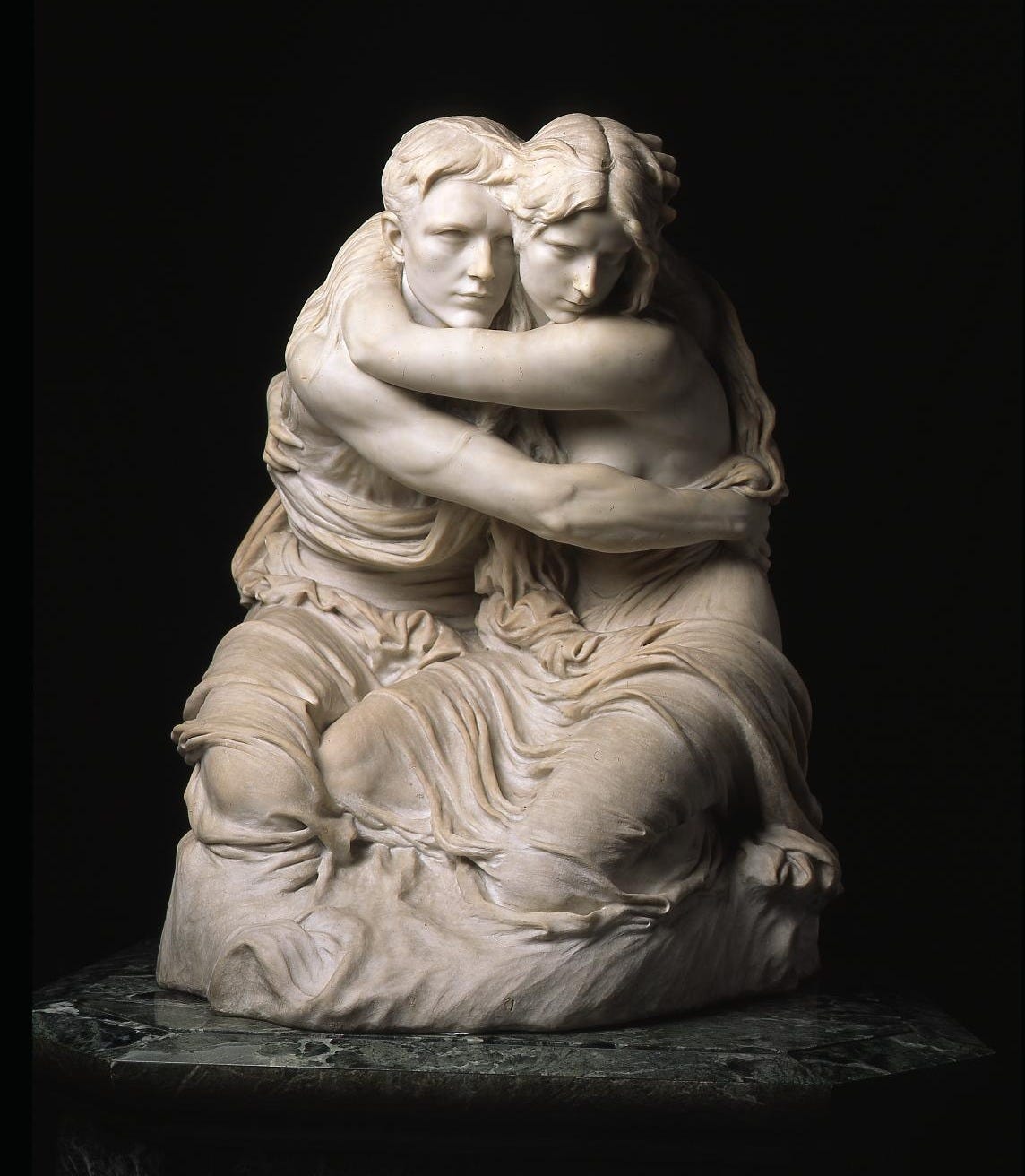
Gentle reader,
I hope someone dear holds you closely today. But if you find yourself lonely, know there is love right here. I offer my words to you like an embrace.
Oh, & a final thought:
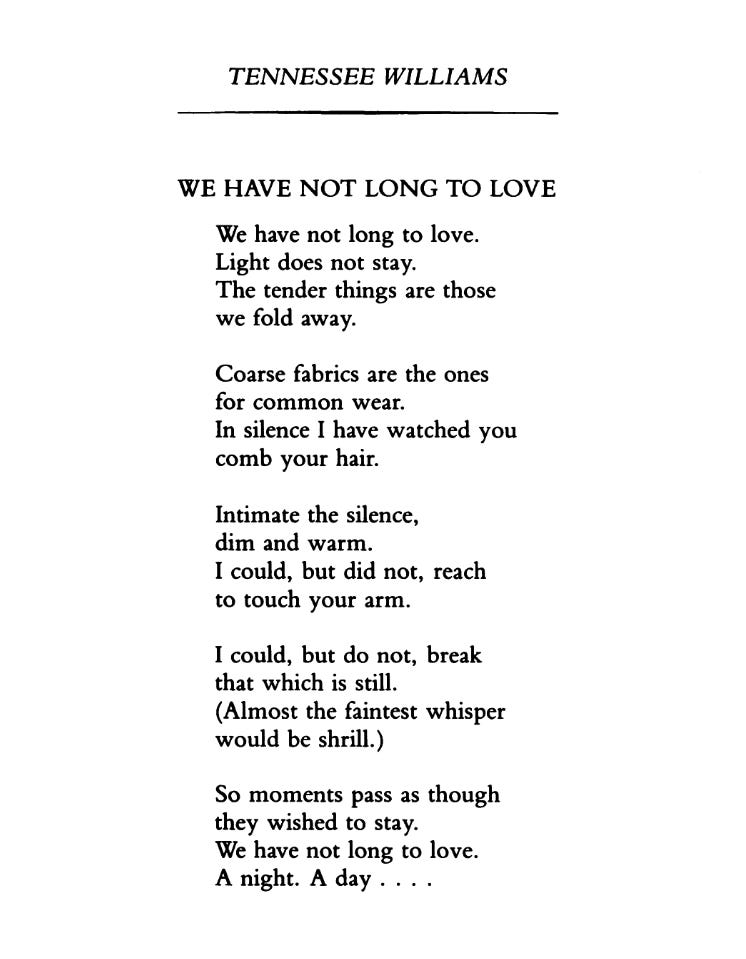
With love always.
— S.
Words are a gift & mine are free to read—always. But if this post touched your heart somehow, consider leaving a tip. It is a labor of love to bring you these writings each month.





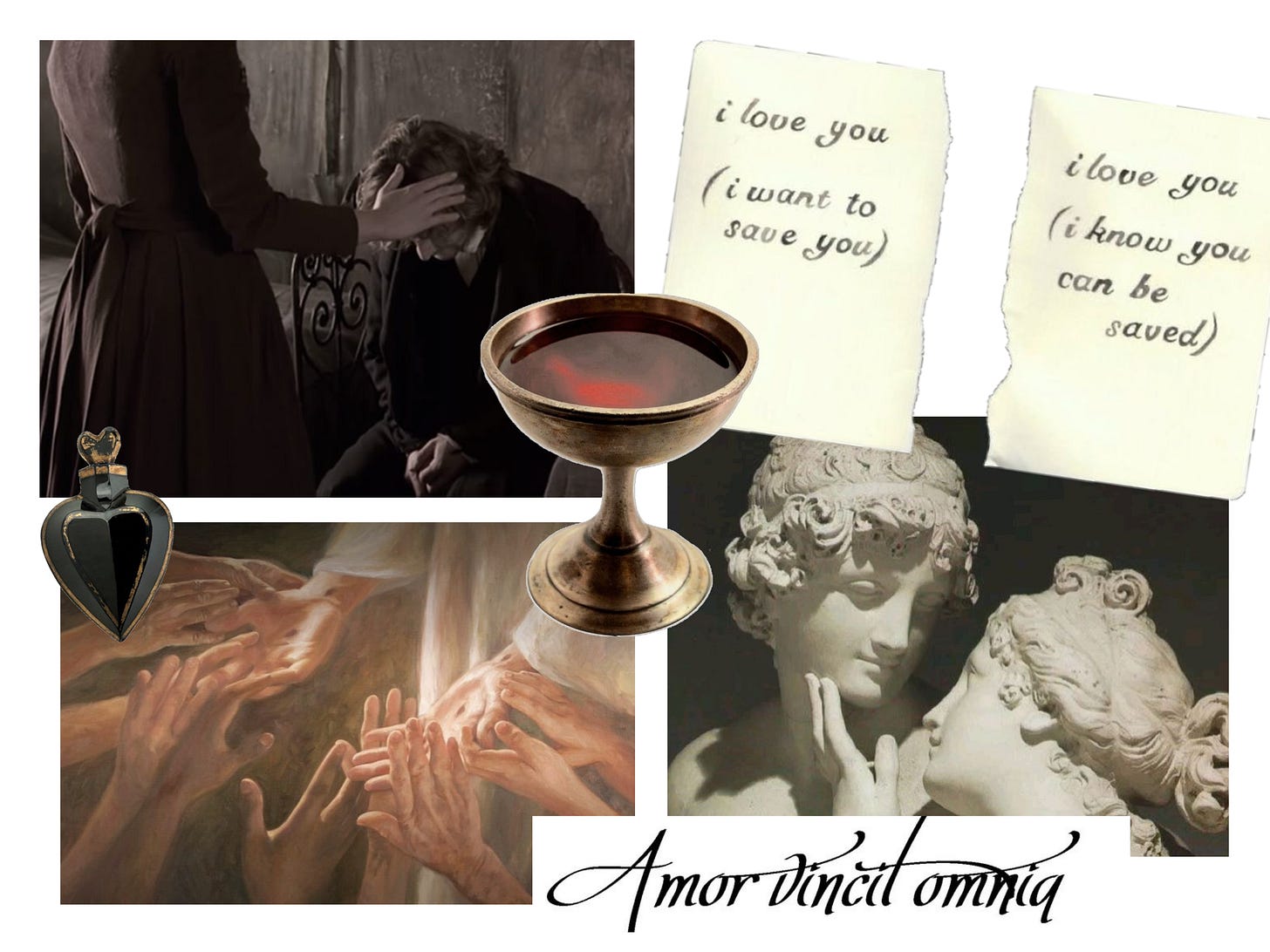
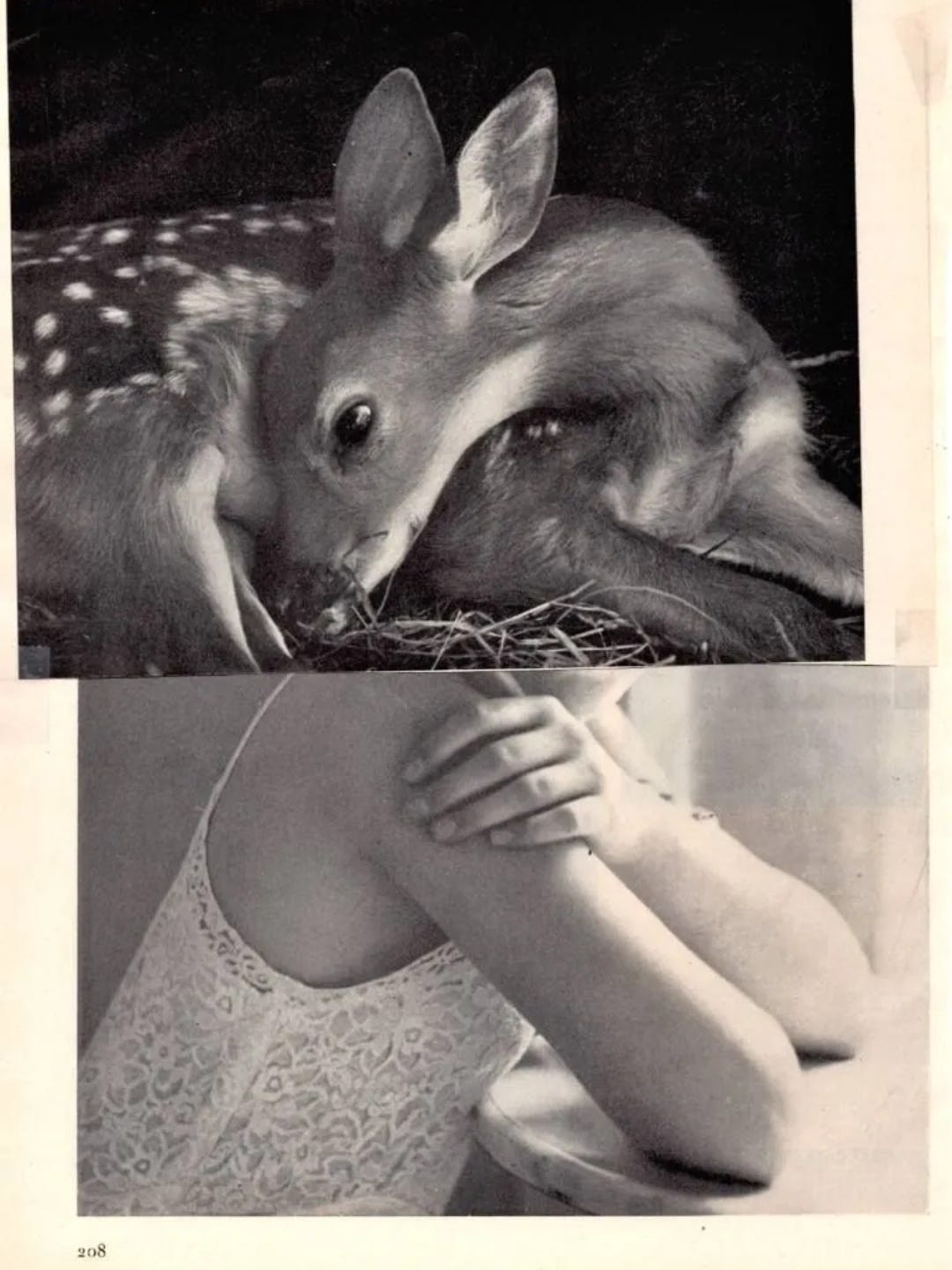
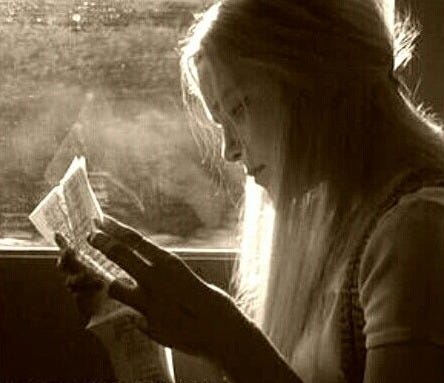
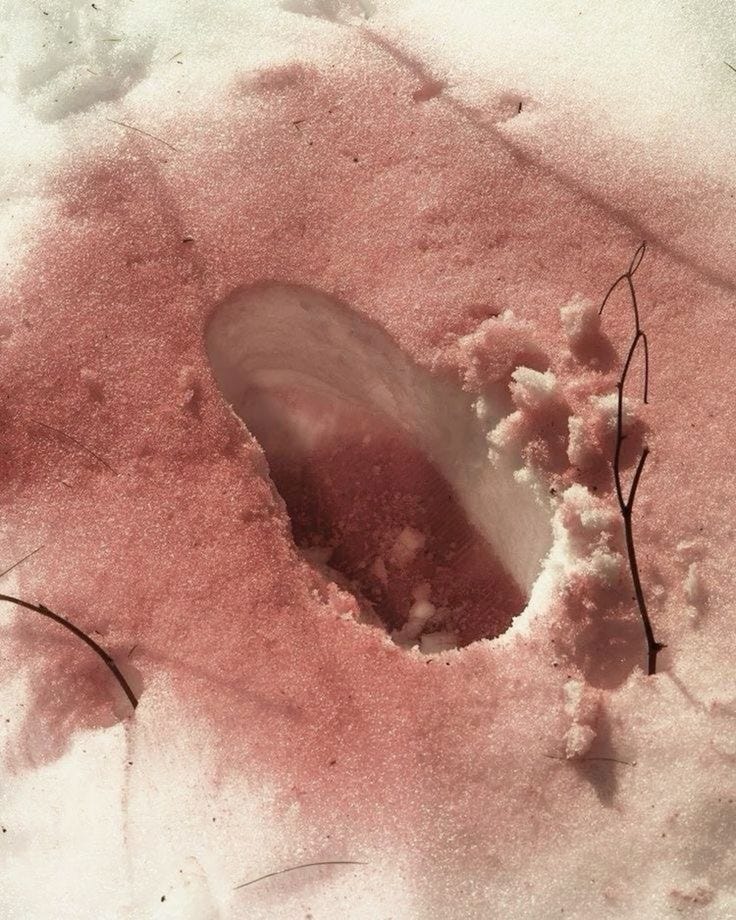

The way you have woven together this essay so gracefully is a feat. I am so full of admiration for you; for your choice pickings of literature; for your gorgeous philosophy. Thank you. I wish you so much love. ❤️
This is a beautiful tapestry of thoughts and types of love and it radiates joy to read it - the acknowledgment of different kinds of loving, of history, of our self-mythic romance - it’s love, it’s joy.